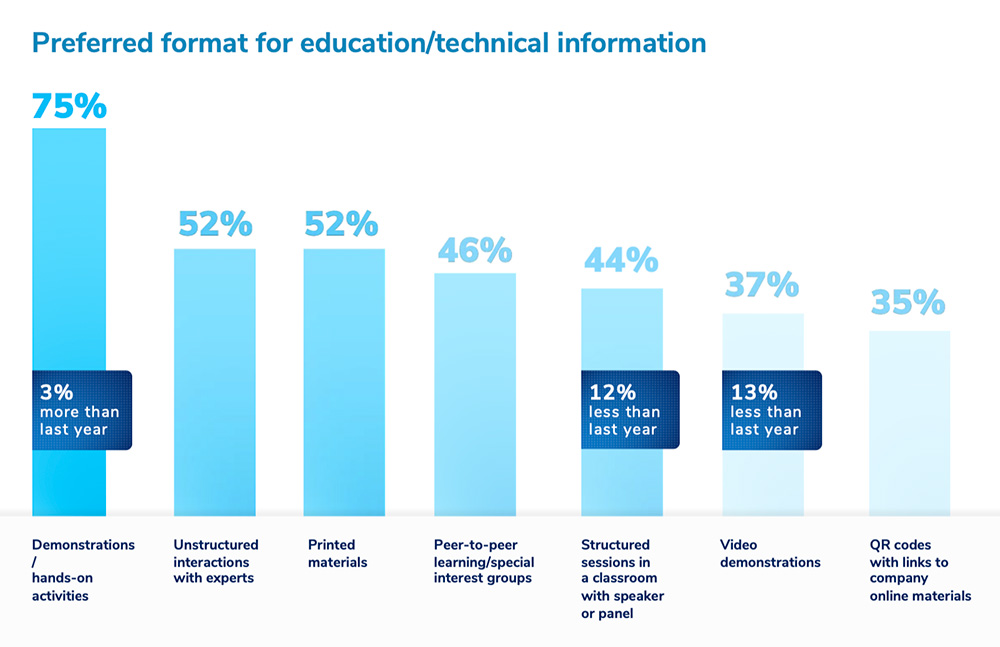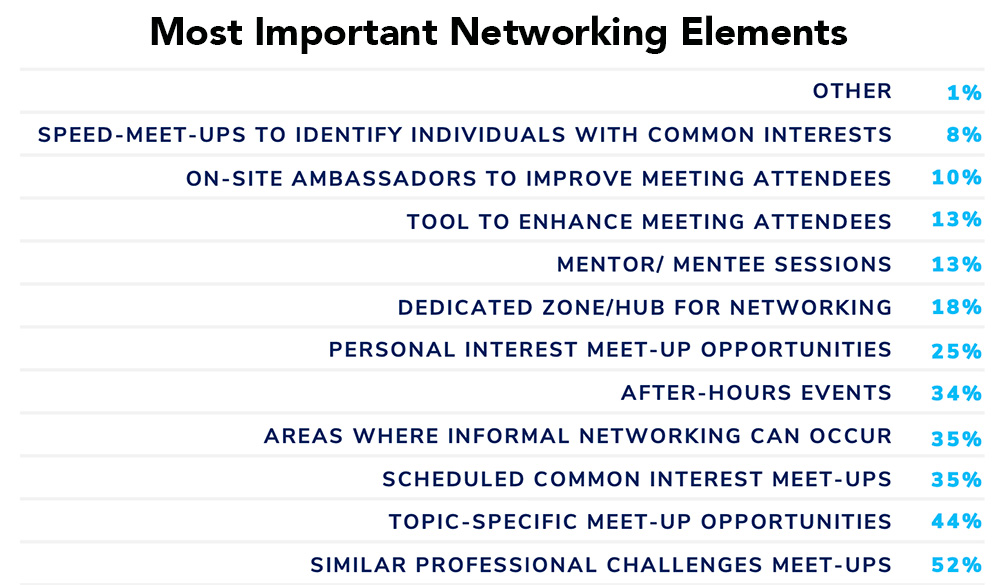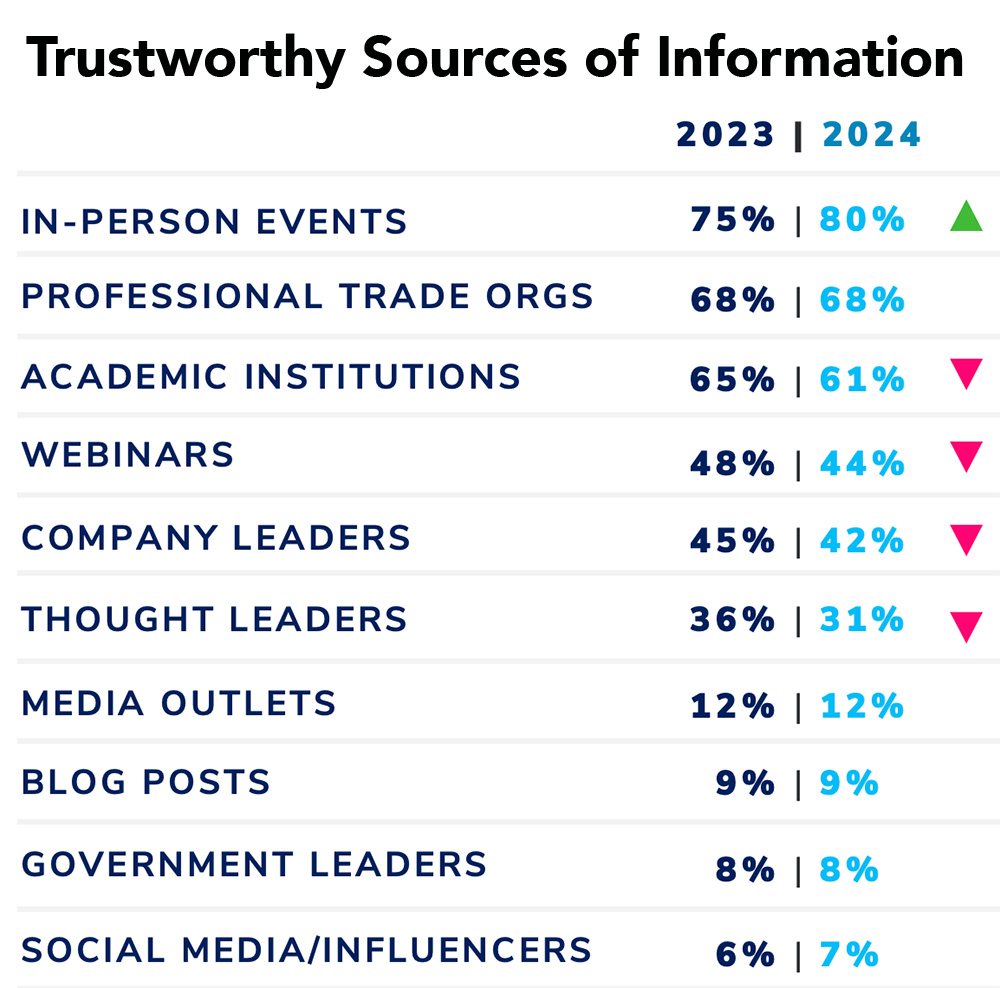There’s encouraging news in the Freeman Trends Report: 2024 Attendee Intent and Behavior, released Tuesday, Jan. 16, by the global events company: Attendance at in-person events, which has risen as the worst of the pandemic has receded, is expected to hold steady over the next 12 months.
But comparisons with the past aren’t the point, said Ken Holsinger, Freeman’s senior vice president, strategy and research. When Holsinger previewed the report during the session, “First Look: Exclusive Data on Attendee Motivators,” at PCMA Convening Leaders 2024 on Jan. 10, he asked session participants to raise their right hands and join in a declaration. “It’s 2024,” he said, “and I want you to repeat after me: I will not … compare my event … to 2019 … anymore.”
“Let’s stop talking about recovery,” Holsinger said. “Let’s stop talking about comparisons to 2019 in our data and let’s start talking about audiences. What motivates them, what drives them?”
During the session, Holsinger joked with participants that they should tuck their feet under their chairs because he was going to step on some toes — there is a disconnect, in many cases, between what event organizers have been offering at their events and what attendees say that they want, the survey revealed.
Putting attendee goals first, Holsinger told Convene, “breaks some of the long-held models that, frankly, are exhibitor- and sponsor-centric in the way that we build our business models.” But, he added, “if the attendee doesn’t have their objectives met, nothing else matters in the entire ecosystem.”
The survey results also challenge the assumption that event organizers should look primarily through the lens of a specific industry or organization when considering what their participants want at events. “Industry is important,” Holsinger said, “but it’s nowhere near the primary driver.” Age, gender, socioeconomic status, and event type are greater predictors of attendee values and behaviors, according to the survey results.
The report is based on the responses of nearly 2,100 individuals to an online survey conducted in November 2023 who had attended in-person and online business events over the past 12 months; the results have a margin of error of plus or minus 2 percentage points. Much of the data is presented using a framework based on the four primary reasons that people attend events, derived from years of research conducted by Freeman: to have fun, to learn, to network, and to do business.
Among the survey highlights:
Immerse Me
Immersive experiences were at the top of the list when respondents were asked to rate the factors that most positively influenced their event experience, chosen by 64 percent. That was followed by customized agendas, chosen by 45 percent; technology that makes consuming events easier, 44 percent; and an immersive, visually appealing atmosphere, 43 percent. Wellness, chosen by only 3 percent of the survey respondents, was at the bottom of the list.
Often identified as a leading event trend, wellness is among the “low-hanging-fruit kinds of trends that are fairly quick and easy to put a label on, and fairly quick and easy and even inexpensive to deploy,” Holsinger told Convene. “The challenge I run into is that it doesn’t line up with often what we hear from attendees and exhibitor sponsors [about their preferences].”
When survey respondents were asked how they ideally would like to feel after listening to a keynote or plenary session, the leading answer, chosen by 38 percent, was “informed,” followed closely by “inspired and motivated” at 35 percent. Only 6 percent chose feeling connected. When the responses were filtered by gender, the percentages changed: Two out of five males preferred to feel informed but nearly half (47 percent) of females preferred to feel inspired.

Wanted: Interactive and In Person
When given a choice, seven out of 10 survey respondents said they preferred to receive training and professional content in person, an increase of 7 percent over last year. When asked to rate their preferences for learning formats at in-person events, demonstrations and hands-on activities were the most popular, chosen by three-quarters of survey respondents. Unstructured interactions with experts and printed materials tied for second place, chosen by more than half (52 percent) of respondents. Classroom sessions with speakers or panels were chosen by 44 percent but suffered a big drop —12 percent — from 2023.

More Purposeful Networking
More than half of attendees want to bond with peers over shared professional challenges and topics, according to the survey. When asked about the factors that most positively influence their networking experience at an event, 52 percent chose meet-ups with professionals with similar challenges, followed by topic-specific meet-up opportunities, chosen by 44 percent of respondents. Some widely used networking tools came in near the bottom of the list, including speed meetups, chosen by 8 percent of survey respondents, and mentor/mentee sessions, chosen by 13 percent. A little more than a third — 35 percent — said that after-hours events positively influenced their networking experiences at events.
When asked to rank the kinds of interactions that are most important in networking at events, 81 percent chose interacting with experts, followed by meeting new contacts, at 68 percent, and peer-to-peer exchanges at 64 percent.
Most so-called networking events consist of “alcohol, dim lights, loud music, and nowhere to sit,” Holsinger said. “You’re just standing in a room yelling at each other face to face and awkwardly trying to read someone’s badge in the dark.” That is the problem with the mentality of making networking a “checkbox” at events, he said. “Who is in charge of the science and understanding how networking actually works, what people want, and most importantly, how to measure and improve it?”

In Events We Trust
“It’s no surprise,” the survey said, “that in an age of AI and misinformation, in-person events are viewed as the most trustworthy sources of information,” chosen by four out of five survey respondents, five percentage points higher than last year. Professional trade organizations, chosen by 68 percent, were also highly rated. Less trusted were thought leaders, 36 percent, and blog posts, 9 percent.
In-person events are also rated at the top of the list when it comes to sources for discovering new products and services, again chosen by four out of five survey respondents, compared with company websites, chosen by 62 percent, and online events, chosen by 38 percent.

For More Information
- Download the full Freeman Trends Report: 2024 Attendee Intent and Behavior.
- PCMA Convening Leaders 2024 registrants can watch the Jan. 10 CL session in which Ken Holsinger and Howard Givner unpack the report on the PCMA Plus event app.
Barbara Palmer is deputy editor of Convene. Graphics from the Freeman report.

